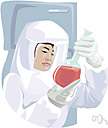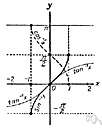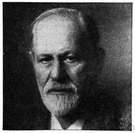analysis
Also found in: Thesaurus, Medical, Financial, Acronyms, Idioms, Encyclopedia, Wikipedia.
Related to analysis: Literary analysis
a·nal·y·sis
(ə-năl′ĭ-sĭs)n. pl. a·nal·y·ses (-sēz′)
1.
a. The separation of an intellectual or material whole into its constituent parts for individual study.
b. The study of such constituent parts and their interrelationships in making up a whole.
c. A spoken or written presentation of such study: published an analysis of poetic meter.
2. Chemistry
a. The separation of a substance into its constituent elements to determine either their nature (qualitative analysis) or their proportions (quantitative analysis).
b. The stated findings of such a separation or determination.
3. Mathematics
a. A branch of mathematics principally involving differential and integral calculus, sequences, and series and concerned with limits and convergence.
b. The method of proof in which a known truth is sought as a consequence of a series of deductions from that which is the thing to be proved.
4. Linguistics The use of function words such as prepositions, pronouns, or auxiliary verbs instead of inflectional endings to express a grammatical relationship; for example, the cover of the dictionary instead of the dictionary's cover.
5. Psychoanalysis.
6. Systems analysis.
[Medieval Latin, from Greek analusis, a dissolving, from analūein, to undo : ana-, throughout; see ana- + lūein, to loosen; see leu- in Indo-European roots.]
American Heritage® Dictionary of the English Language, Fifth Edition. Copyright © 2016 by Houghton Mifflin Harcourt Publishing Company. Published by Houghton Mifflin Harcourt Publishing Company. All rights reserved.
analysis
(əˈnælɪsɪs)n, pl -ses (-ˌsiːz)
1. the division of a physical or abstract whole into its constituent parts to examine or determine their relationship or value. Compare synthesis1
2. a statement of the results of this
3. (Psychoanalysis) short for psychoanalysis
4. (Chemistry) chem
a. the decomposition of a substance into its elements, radicals, or other constituents in order to determine the kinds of constituents present (qualitative analysis) or the amount of each constituent (quantitative analysis)
b. the result obtained by such a determination
5. (Linguistics) linguistics the use of word order together with word function to express syntactic relations in a language, as opposed to the use of inflections. Compare synthesis4
6. (Mathematics) maths the branch of mathematics principally concerned with the properties of functions, largely arising out of calculus
7. (Philosophy) philosophy (in the writings of Kant) the separation of a concept from another that contains it. Compare synthesis6a
8. in the last analysis in the final analysis in the ultimate analysis after everything has been given due consideration
[C16: from New Latin, from Greek analusis, literally: a dissolving, from analuein, from ana- + luein to loosen]
Collins English Dictionary – Complete and Unabridged, 12th Edition 2014 © HarperCollins Publishers 1991, 1994, 1998, 2000, 2003, 2006, 2007, 2009, 2011, 2014
a•nal•y•sis
(əˈnæl ə sɪs)n., pl. -ses (-ˌsiz)
1. the separating of any material or abstract entity into its constituent elements (opposed to synthesis).
2. this process as a method of studying the nature of something or of determining its essential features and their relations.
3. a presentation, usu. in writing, of the results of this process.
4.
a. an investigation based on the properties of numbers.
b. the discussion of a problem by algebra, as opposed to geometry.
c. the branch of mathematics consisting of calculus and its higher developments.
5.
a. intentionally produced decomposition or separation of materials into their ingredients or elements, as to find their kind or quantity.
b. the ascertainment of the kind or amount of one or more of the constituents of materials.
Random House Kernerman Webster's College Dictionary, © 2010 K Dictionaries Ltd. Copyright 2005, 1997, 1991 by Random House, Inc. All rights reserved.
a·nal·y·sis
(ə-năl′ĭ-sĭs) Plural analyses (ə-năl′ĭ-sēz′)
The separation of a substance into its parts, usually by chemical means, for the study and identification of each component. ♦ Qualitative analysis determines what substances are present in a compound. ♦ Quantitative analysis determines how much of each substance is present in a compound.
The American Heritage® Student Science Dictionary, Second Edition. Copyright © 2014 by Houghton Mifflin Harcourt Publishing Company. Published by Houghton Mifflin Harcourt Publishing Company. All rights reserved.
analysis
In intelligence usage, a step in the processing phase of the intelligence cycle in which information is subjected to review in order to identify significant facts for subsequent interpretation. See also intelligence cycle.
Dictionary of Military and Associated Terms. US Department of Defense 2005.
analysis
the process of separating a whole into its parts to discover their function, relationship, etc. See also logic; psychology.
See also: Thinking-Ologies & -Isms. Copyright 2008 The Gale Group, Inc. All rights reserved.
ThesaurusAntonymsRelated WordsSynonymsLegend:
Switch to new thesaurus
| Noun | 1. |  analysis - an investigation of the component parts of a whole and their relations in making up the whole analysis - an investigation of the component parts of a whole and their relations in making up the wholeinvestigating, investigation - the work of inquiring into something thoroughly and systematically anatomy - a detailed analysis; "he studied the anatomy of crimes" case study - a detailed analysis of a person or group from a social or psychological or medical point of view chemical analysis, qualitative analysis - the act of decomposing a substance into its constituent elements cost analysis - breaking down the costs of some operation and reporting on each factor separately dissection - detailed critical analysis or examination one part at a time (as of a literary work) fundamental analysis, fundamentals analysis - (stock exchange) the use of fundamentals as an investment strategy technical analysis, technical analysis of stock trends - (stock exchange) analysis of past price changes in the hope of forecasting future price changes |
| 2. |  analysis - the abstract separation of a whole into its constituent parts in order to study the parts and their relations analysis - the abstract separation of a whole into its constituent parts in order to study the parts and their relationspartitioning, breakdown - an analysis into mutually exclusive categories cost-benefit analysis - an analysis of the cost effectiveness of different alternatives in order to see whether the benefits outweigh the costs dissection - a minute and critical analysis reasoning by elimination, elimination - analysis of a problem into alternative possibilities followed by the systematic rejection of unacceptable alternatives reductionism - the analysis of complex things into simpler constituents systems analysis - analysis of all aspects of a project along with ways to collect information about the operation of its parts trend analysis - analysis of changes over time synthetic thinking, synthesis - the combination of ideas into a complex whole | |
| 3. | analysis - a form of literary criticism in which the structure of a piece of writing is analyzed literary criticism, criticism - a written evaluation of a work of literature | |
| 4. | analysis - the use of closed-class words instead of inflections: e.g., `the father of the bride' instead of `the bride's father' expressive style, style - a way of expressing something (in language or art or music etc.) that is characteristic of a particular person or group of people or period; "all the reporters were expected to adopt the style of the newspaper" | |
| 5. |  analysis - a branch of mathematics involving calculus and the theory of limits; sequences and series and integration and differentiation analysis - a branch of mathematics involving calculus and the theory of limits; sequences and series and integration and differentiationmath, mathematics, maths - a science (or group of related sciences) dealing with the logic of quantity and shape and arrangement infinitesimal calculus, calculus - the branch of mathematics that is concerned with limits and with the differentiation and integration of functions Fourier analysis, harmonic analysis - analysis of a periodic function into a sum of simple sinusoidal components | |
| 6. |  analysis - a set of techniques for exploring underlying motives and a method of treating various mental disorders; based on the theories of Sigmund Freud; "his physician recommended psychoanalysis" analysis - a set of techniques for exploring underlying motives and a method of treating various mental disorders; based on the theories of Sigmund Freud; "his physician recommended psychoanalysis"psychotherapy - the treatment of mental or emotional problems by psychological means hypnoanalysis - the use of hypnosis in conjunction with psychoanalysis anal personality, anal retentive personality - (psychoanalysis) a personality characterized by meticulous neatness and suspicion and reserve; said to be formed in early childhood by fixation during the anal stage of development (usually as a consequence of toilet training) genital personality - (psychoanalysis) the mature personality which is not dominated by infantile pleasure drives oral personality - (psychoanalysis) a personality characterized either by generous optimism or aggressive and ambitious selfishness; formed in early childhood by fixation during the oral stage of development ego - (psychoanalysis) the conscious mind superego - (psychoanalysis) that part of the unconscious mind that acts as a conscience id - (psychoanalysis) primitive instincts and energies underlying all psychic activity introjection - (psychoanalysis) the internalization of the parent figures and their values; leads to the formation of the superego pleasure principle, pleasure-pain principle, pleasure-unpleasure principle - (psychoanalysis) the governing principle of the id; the principle that an infant seeks gratification and fails to distinguish fantasy from reality reality principle - (psychoanalysis) the governing principle of the ego; the principle that as a child grows it becomes aware of the real environment and the need to accommodate to it introject - (psychoanalysis) parental figures (and their values) that you introjected as a child; the voice of conscience is usually a parent's voice internalized ego ideal - (psychoanalysis) the part of the ego that contains an ideal of personal excellence toward which a person strives imago - (psychoanalysis) an idealized image of someone (usually a parent) formed in childhood condensation - (psychoanalysis) an unconscious process whereby two ideas or images combine into a single symbol; especially in dreams transference - (psychoanalysis) the process whereby emotions are passed on or displaced from one person to another; during psychoanalysis the displacement of feelings toward others (usually the parents) is onto the analyst latent content - (psychoanalysis) hidden meaning of a fantasy or dream complex - (psychoanalysis) a combination of emotions and impulses that have been rejected from awareness but still influence a person's behavior libido - (psychoanalysis) a Freudian term for sexual urge or desire penis envy - (psychoanalysis) a female's presumed envy of the male's penis; said to explain femininity libidinal energy - (psychoanalysis) psychic energy produced by the libido cathexis, charge - (psychoanalysis) the libidinal energy invested in some idea or person or object; "Freud thought of cathexis as a psychic analog of an electrical charge" acathexis - (psychoanalysis) a lack of cathexis; a condition in which significant objects or memories arouse no emotion in an individual psychosexual development - (psychoanalysis) the process during which personality and sexual behavior mature through a series of stages: first oral stage and then anal stage and then phallic stage and then latency stage and finally genital stage anaclisis - (psychoanalysis) relationship marked by strong dependence on others; especially a libidinal attachment to e.g. a parental figure castration anxiety - (psychoanalysis) anxiety resulting from real or imagined threats to your sexual functions; originally applied only to men but can in principle apply to women anal phase, anal stage - (psychoanalysis) the second sexual and social stage of a child's development during which bowel control is learned genital phase, genital stage - (psychoanalysis) the fifth sexual and social stage in a person's development occurring during adolescence; interest focuses on sexual activity latency period, latency phase, latency stage - (psychoanalysis) the fourth period (from about age 5 or 6 until puberty) during which sexual interests are supposed to be sublimated into other activities oral phase, oral stage - (psychoanalysis) the first sexual and social stage of an infant's development; the mouth is the focus of the libido and satisfaction comes from suckling and chewing and biting phallic phase, phallic stage - (psychoanalysis) the third stage in a child's development when awareness of and manipulation of the genitals is supposed to be a primary source of pleasure abreact - discharge bad feelings or tension through verbalization anal retentive, anal - a stage in psychosexual development when the child's interest is concentrated on the anal region; fixation at this stage is said to result in orderliness, meanness, stubbornness, compulsiveness, etc. oral - a stage in psychosexual development when the child's interest is concentrated in the mouth; fixation at this stage is said to result in dependence, selfishness, and aggression |
Based on WordNet 3.0, Farlex clipart collection. © 2003-2012 Princeton University, Farlex Inc.
analysis
noun
1. study, reasoning, opinion, judgment, interpretation, evaluation, estimation, dissection We did an analysis of the way they have spent money in the past.
2. examination, test, division, inquiry, investigation, resolution, interpretation, breakdown, scanning, separation, evaluation, scrutiny, sifting, anatomy, dissolution, dissection, assay, perusal, anatomization They collect blood samples for analysis at the laboratory.
Collins Thesaurus of the English Language – Complete and Unabridged 2nd Edition. 2002 © HarperCollins Publishers 1995, 2002
analysis
noun1. The separation of a whole into its parts for study:
2. A close or systematic study:
The American Heritage® Roget's Thesaurus. Copyright © 2013, 2014 by Houghton Mifflin Harcourt Publishing Company. Published by Houghton Mifflin Harcourt Publishing Company. All rights reserved.
Translations
تحليلتـَحْليلتَحْلِيلتحليل رياضيتحليل مختبري
anàlisi
analýzarozborpsychoanalýza
analysepsykoanalyse
analitikoanalizo
analüüs
analyysi
analiza
analíziselemzés
greiningsálgreining
分析分析判断解析解析学
분석
analitikasanalitinisanalizėpsichoanalitikaspsichoanalizė
analīzepsihoanalīze
analýzarozbor
analizapresoja
analys
การวิเคราะห์
quá trình phân tích
Collins Spanish Dictionary - Complete and Unabridged 8th Edition 2005 © William Collins Sons & Co. Ltd. 1971, 1988 © HarperCollins Publishers 1992, 1993, 1996, 1997, 2000, 2003, 2005
analysis
[əˈnælɪsɪs] [analyses] [əˈnælɪsiːz] (pl) n [data, information, results] → analyse f; [situation, problem, performance] → analyse f
statistical analysis → analyse statistique
economic analysis → analyse économique
in the final analysis, in the last analysis (mainly US) (= in the end) → en dernière analyse
statistical analysis → analyse statistique
economic analysis → analyse économique
in the final analysis, in the last analysis (mainly US) (= in the end) → en dernière analyse
Collins English/French Electronic Resource. © HarperCollins Publishers 2005
analysis
n pl <analyses>
(= examination) → Analyse f; (Gram, of sentence also) → (Zer)gliederung f; what’s your analysis of the situation? → wie beurteilen Sie die Situation?; in the last or final analysis → letzten Endes; on (closer) analysis → bei genauerer Untersuchung
Collins German Dictionary – Complete and Unabridged 7th Edition 2005. © William Collins Sons & Co. Ltd. 1980 © HarperCollins Publishers 1991, 1997, 1999, 2004, 2005, 2007
analysis
[əˈnæləsɪs] n (analyses (pl)) [əˈnælɪsiːz] → analisi f inv (Psych) → (psic)analisi f invin the last analysis → in ultima analisi
Collins Italian Dictionary 1st Edition © HarperCollins Publishers 1995
analysis
(əˈnӕləsis) – plural aˈnalyses (-siːz) – noun1. (a) detailed examination of something (a sentence, a chemical compound etc) especially by breaking it up into the parts of which it is made up. The chemist is making an analysis of the poison; close analysis of the situation.
2. (especially American) psycho-analysis. He is undergoing analysis for his emotional problems.
analyse (ˈӕnəlaiz) , (American) analyze verb to examine the nature of (something) especially by breaking up (a whole) into parts. The doctor analysed the blood sample.
analyst (ˈӕnəlist) noun1. a person who analyses. a chemical analyst.
2. (especially American) a psychiatrist.
analytical (ӕnəˈlitikl) adjectiveKernerman English Multilingual Dictionary © 2006-2013 K Dictionaries Ltd.
analysis
→ تـَحْليل analýza analyse Analyse ανάλυση análisis analyysi analyse analiza analisi 分析 분석 analyse analyse analiza análise анализ analys การวิเคราะห์ çözümleme quá trình phân tích 分析Multilingual Translator © HarperCollins Publishers 2009
a·nal·y·sis
n. análisis, prueba;
accumulation ___ → ___ de acumulación;
amino acid ___ → ___ de aminoácido;
bite ___ → ___ de la mordida;
breath ___ → ___ del aliento;
cephalometric ___ → ___ cefalométrico;
character ___ → ___ del carácter;
cost ___ → ___ de costos;
data ___ → ___ de datos;
dream ___ → ___ de los sueños;
gastric ___ → ___ gástrico;
hair ___ → ___ del pelo;
qualitative ___ → ___ cualitativo;
quantitative ___ → ___ cuantitativo.
English-Spanish Medical Dictionary © Farlex 2012
analysis
n (pl -ses) análisis m; (psych, fam) psicoanálisis m, análisis m (fam); semen — análisis de semenEnglish-Spanish/Spanish-English Medical Dictionary Copyright © 2006 by The McGraw-Hill Companies, Inc. All rights reserved.